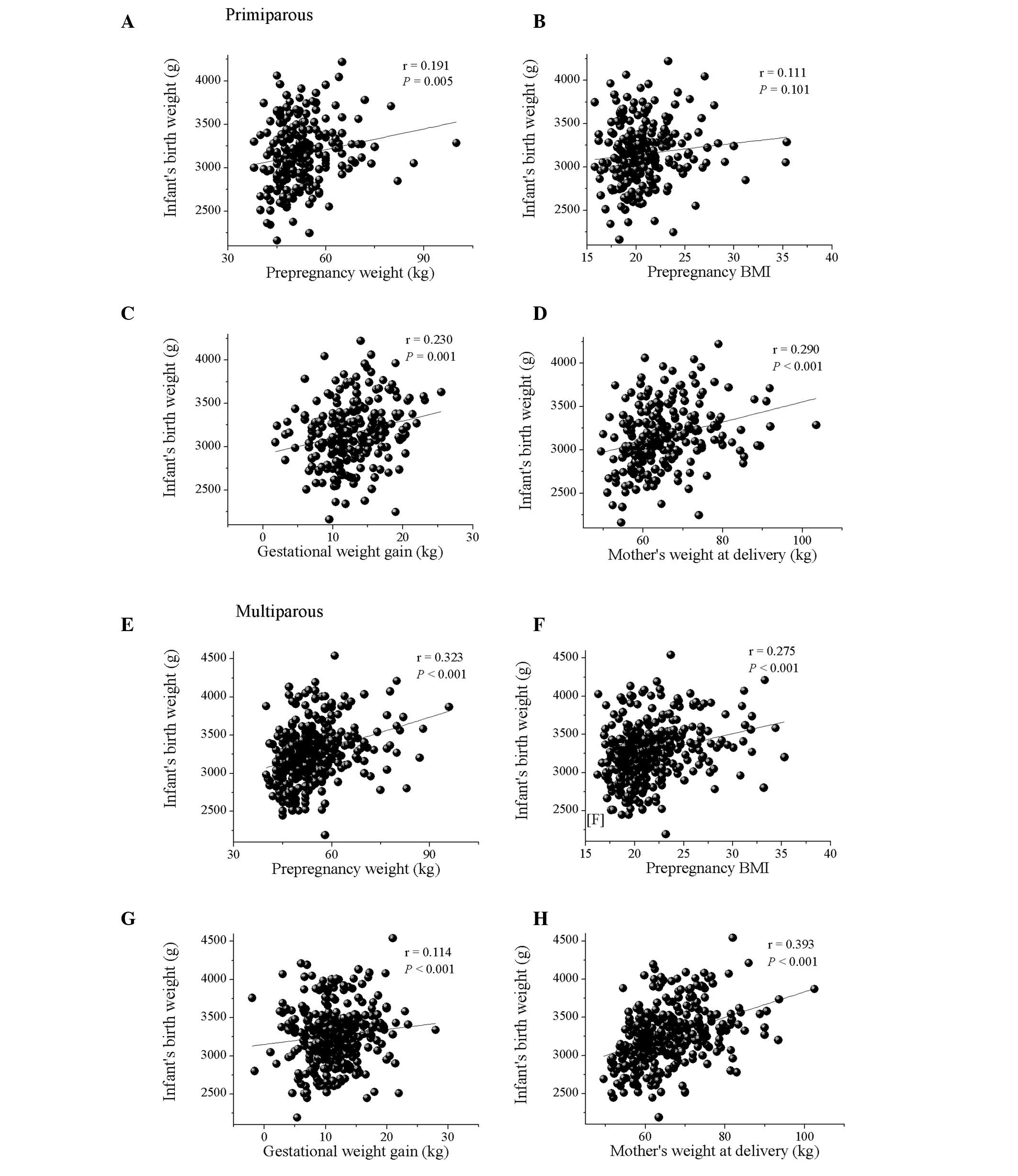|
1.
|
Cunningham FG, Leveno KJ, Bloom SL, et al:
Maternal physiology. Williams Obstetrics. 23rd edition.
McGraw-Hill; New York, NY: pp. 107–135. 2010
|
|
2.
|
Hytten FE and Leitch I: The Physiology of
Human Pregnancy. 2nd edition. Blackwell Scientific Publications;
Oxford, United Kingdom: pp. 5991971
|
|
3.
|
Ueda Y, Maruo M and Niiya K: Study on the
usefulness of maternal weight gain at 16 weeks’ gestation for the
prediction of total weight gain during pregnancy. Acta Obstet
Gynaecol Jpn. 53:980–988. 2001.(In Japanese).
|
|
4.
|
Johnson JW, Longmate JA and Frentzen B:
Excessive maternal weight and pregnancy outcome. Am J Obstet
Gynecol. 67:353–370; discussion 370–372,. 1992. View Article : Google Scholar
|
|
5.
|
Weiss JL, Malone FD, Emig D, et al FASTER
Research Consortium: Obesity, obstetric complications and cesarean
delivery rate - a population-based screening study. Am J Obstet
Gynecol. 190:1091–1097. 2004. View Article : Google Scholar : PubMed/NCBI
|
|
6.
|
Spinillo A, Capuzzo E, Piazzi G, Ferrari
A, Morales V and Di Mario M: Risk for spontaneous preterm delivery
by combined body mass index and gestational weight gain patterns.
Acta Obstet Gynecol Scand. 77:32–36. 1998. View Article : Google Scholar : PubMed/NCBI
|
|
7.
|
Schieve LA, Cogswell ME, Scanlon KS, et al
The NMIHS Collaborative Study Group: Prepregnancy body mass index
and pregnancy weight gain: associations with preterm delivery.
Obstet Gynecol. 96:194–200. 2000. View Article : Google Scholar : PubMed/NCBI
|
|
8.
|
Ehrenberg HM, Dierker L, Milluzzi C and
Mercer BM: Low maternal weight, failure to thrive in pregnancy, and
adverse pregnancy outcomes. Am J Obstet Gynecol. 189:1726–1730.
2003. View Article : Google Scholar : PubMed/NCBI
|
|
9.
|
Hendler I, Goldenberg RL, Mercer BM, et
al: The Preterm Prediction Study: association between maternal body
mass index and spontaneous and indicated preterm birth. Am J Obstet
Gynecol. 92:882–886. 2005. View Article : Google Scholar : PubMed/NCBI
|
|
10.
|
Shaw GM, Velie EM and Schaffer D: Risk of
neural tube defect-affected pregnancies among obese females. JAMA.
275:1093–1096. 1996. View Article : Google Scholar : PubMed/NCBI
|
|
11.
|
Cnattingius S, Bergström R, Lipworth L and
Kramer MS: Prepregnancy weight and the risk of adverse pregnancy
outcomes. N Engl J Med. 338:147–152. 1998. View Article : Google Scholar : PubMed/NCBI
|
|
12.
|
Jensen DM, Damm P, Sørensen B, et al:
Pregnancy outcome and prepregnancy body mass index in 2459
glucose-tolerant Danish females. Am J Obstet Gynecol. 189:239–244.
2003. View Article : Google Scholar : PubMed/NCBI
|
|
13.
|
Bhattacharya S, Campbell DM, Liston WA and
Bhattacharya S: Effect of body mass index on pregnancy outcomes in
nulliparous females delivering singleton babies. BMC Public Health.
7:1682007. View Article : Google Scholar : PubMed/NCBI
|
|
14.
|
Crane JM, White J, Murphy P, Burrage L and
Hutchens D: The effect of gestational weight gain by body mass
index on maternal and neonatal outcomes. J Obstet Gynaecol Can.
31:28–35. 2009.PubMed/NCBI
|
|
15.
|
Gluckman P and Hanson M: The conceptual
basis for the developmental origins of health and disease.
Developmental Origins of Health and Disease. Cambridge University
Press; Cambridge, United Kindom: pp. 33–50. 2006, View Article : Google Scholar
|
|
16.
|
World Health Organization (WHO): Global
Database on Body Mass Index, BMI classification. http://www.who.int/bmi/index.jspuri.
Accessed November 12, 2012.
|
|
17.
|
Japan Society for the Study of Obesity
(JASSO): Obesity diagnosis by body weight and BMI criteria.
http://www.soc.nii.ac.jp/jasso/index.htmluri.
Accessed November 12, 2012 (In Japanese).
|
|
18.
|
Ministry of Health, Labour and Welfare:
Summary report of annual vital statistics report (preliminary
data). 2011, http://www.mhlw.go.jp/toukei/saikin/hw/jinkou/geppo/nengai11/kekka02.htmluri.
Accessed December 1, 2012 (In Japanese).
|
|
19.
|
Ministry of Health, Labour and Welfare:
National Health and Nutrition Survey. http://www.mhlw.go.jp/stf/houdou/2r98520000020qbb-att/2r98520000021c1g.pdf#search='http%3A%2F%2Fwww.mhlw.go.jp%2Fstf%2Fhoudou%2F2r98520000020qbbatt%2F2r98520000021c1g.pdfuri.
Accessed December 1, 2012 (In Japanese).
|
|
20.
|
Getahun D, Ananth CV, Peltier MR, Salihu
HM and Scorza WE: Changes in prepregnancy body mass index between
the first and second pregnancies and risk of
large-for-gestational-age birth. Am J Obstet Gynecol. 196:530.e1–8.
2007.PubMed/NCBI
|
|
21.
|
Thame M, Osmond C, Bennett F, Wilks R and
Forrester T: Fetal growth is directly related to maternal
anthropometry and placental volume. Eur J Clin Nutr. 58:894–900.
2004.PubMed/NCBI
|
|
22.
|
Frederick IO, Williams MA, Sales AE,
Martin DP and Killien M: Pre-pregnancy body mass index, gestational
weight gain, and other maternal characteristics in relation to
infant birth weight. Matern Child Health J. 12:557–567. 2008.
View Article : Google Scholar : PubMed/NCBI
|
|
23.
|
Ogawa Y, Iwamura T, Kuriya N, et al: Birth
size standards by gestational age for Japanese neonates. Acta
Neonatol Jpn. 34:624–632. 1998.(In Japanese).
|
|
24.
|
Neonatal Research Network: A Multicenter
Benchmark Research on Neonatal Outcome in Japan. http://nrn.shiga-med.ac.jp/DOC/NRNcommon/hokokusho/H21/H21HOKOKUSHO_SOKATSU_BUNTAN.pdfuri.
Accessed December 1, 2012 (In Japanese).
|
|
25.
|
Herrera E and Amusquivar E: Lipid
metabolism in the fetus and the newborn. Diabetes Metab Res Rev.
16:202–210. 2000. View Article : Google Scholar : PubMed/NCBI
|
|
26.
|
Kaplan NM: The deadly quartet. Upper-body
obesity, glucose intolerance, hypertriglyceridemia, and
hypertension. Arch Intern Med. 149:1514–1520. 1989. View Article : Google Scholar : PubMed/NCBI
|
|
27.
|
Shaper AG, Wannamethee SG and Walker M:
Body weight: implications for the prevention of coronary heart
disease, stroke, and diabetes mellitus in a cohort study of middle
aged men. BMJ. 314:1311–1317. 1997. View Article : Google Scholar : PubMed/NCBI
|
|
28.
|
Schulte H, Cullen P and Assmann G:
Obesity, mortality and cardiovascular disease in the Münster Heart
Study (PROCAM). Atherosclerosis. 144:199–209. 1999.
|















